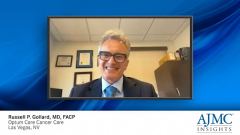
Optimizing Hemophilia Treatment: Strategies and Adherence
Steven W. Pipe, MD, shares insights on optimizing hemophilia treatment schedules and minimizing hoarding of factor VIII prophylaxis or emicizumab for improved patient adherence.
Episodes in this series

This is a video synopsis/summary of an Insights featuring Steven W. Pipe, MD.
Pipe addresses the critical issue of optimizing hemophilia treatment schedules and minimizing medication hoarding. The focus is on ensuring timely and infrequent reorders of prophylactic medications for patients. With a particular emphasis on emicizumab, given its extended dosing intervals, pharmacies often dispense 1 to 2 months' worth, effectively regulating the vial quantities at home. Unlike the factor replacement therapy era, where frequent dispensing was needed, emicizumab's lower intensity prophylaxis reduces the necessity for regular insurance doses. Pipe emphasizes the importance of communication among patients, health care providers, and pharmacies to match inventory with utilization, avoiding wastage and expiration. The discussion also delves into challenges with emicizumab vial sizes, highlighting the need for more options to accommodate individual patient weights. While adherence remains a consideration, the consequences of nonadherence with emicizumab are comparatively minimized, providing reassurance to patients. The interview underscores evolving strategies to optimize treatment efficiency, enhance patient adherence, and navigate the unique considerations associated with both factor replacement and emicizumab therapies in hemophilia care.
Video synopsis is AI-generated and reviewed by AJMC® editorial staff.
Newsletter
Stay ahead of policy, cost, and value—subscribe to AJMC for expert insights at the intersection of clinical care and health economics.







